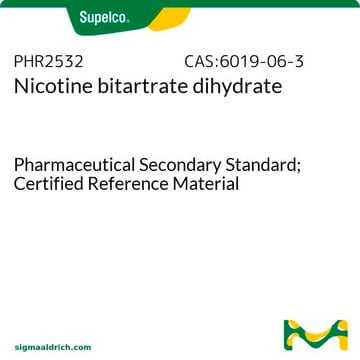1463304
USP
Nikotinbitartratdihydrat
United States Pharmacopeia (USP) Reference Standard
Synonym(e):
(−)-Nikotin -hydrogen-tartrat (Salz) Dihydrat
About This Item
Empfohlene Produkte
Qualität
pharmaceutical primary standard
API-Familie
nicotine
Hersteller/Markenname
USP
Anwendung(en)
pharmaceutical (small molecule)
Format
neat
Lagertemp.
2-8°C
InChI
1S/C17H15ClN2O3/c1-9(2)16(22)19-11-4-5-14(21)12(8-11)17-20-13-7-10(18)3-6-15(13)23-17/h3-9,20H,1-2H3,(H,19,22)/b17-12-
InChIKey
YGMGVHYZWYRTJJ-ATVHPVEESA-N
Suchen Sie nach ähnlichen Produkten? Aufrufen Leitfaden zum Produktvergleich
Allgemeine Beschreibung
Anwendung
Also used to prepare standard, system suitability, sensitivity, and standard stock solution for assay, identification, performance test, and impurity analysis according to the given below monographs of United States Pharmacopeia (USP):
- Nicotine
- Nicotine Polacrilex
- Nicotine Transdermal System
Hinweis zur Analyse
Sonstige Hinweise
Ähnliches Produkt
Signalwort
Danger
H-Sätze
Gefahreneinstufungen
Acute Tox. 1 Dermal - Acute Tox. 3 Inhalation - Acute Tox. 3 Oral - STOT RE 1
Lagerklassenschlüssel
6.1A - Combustible acute toxic Cat. 1 and 2 / very toxic hazardous materials
WGK
WGK 3
Flammpunkt (°F)
Not applicable
Flammpunkt (°C)
Not applicable
Analysenzertifikate (COA)
Suchen Sie nach Analysenzertifikate (COA), indem Sie die Lot-/Chargennummer des Produkts eingeben. Lot- und Chargennummern sind auf dem Produktetikett hinter den Wörtern ‘Lot’ oder ‘Batch’ (Lot oder Charge) zu finden.
Besitzen Sie dieses Produkt bereits?
In der Dokumentenbibliothek finden Sie die Dokumentation zu den Produkten, die Sie kürzlich erworben haben.
Kunden haben sich ebenfalls angesehen
Unser Team von Wissenschaftlern verfügt über Erfahrung in allen Forschungsbereichen einschließlich Life Science, Materialwissenschaften, chemischer Synthese, Chromatographie, Analytik und vielen mehr..
Setzen Sie sich mit dem technischen Dienst in Verbindung.







